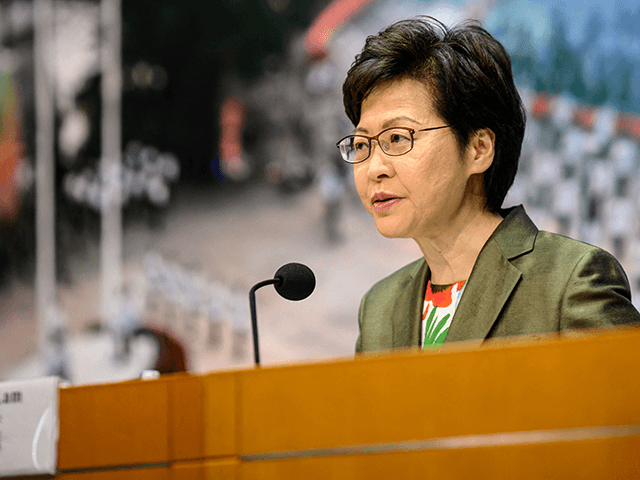The government of Hong Kong on Wednesday objected to U.S. media reports that several large tech companies are threatening to pull out of Hong Kong over new laws that would criminalize “doxxing,” the malicious exposure of private data, and hold platforms like Facebook, Twitter, and Google liable for allowing the activity.
According to Hong Kong officials, the reports were “misleading” and none of the companies are actively threatening to leave the city.
The issue was raised in a Tuesday report from the Wall Street Journal (WSJ), which quoted an alleged letter from the Asia Internet Coalition (AIC) to Hong Kong’s Privacy Commissioner for Personal Data.
The AIC is an industry group based in Singapore that includes the Asian operations of Western Big Tech companies like Facebook and Google. The tech companies maintain modest offices in Hong Kong that could put a few hundred employees at risk of prosecution.
The alleged AIC letter warned that Internet firms could be held liable for the criminal actions of users under the proposed anti-doxxing law. The penalties include hefty fines and up to five years in prison.
“The only way to avoid these sanctions for technology companies would be to refrain from investing and offering the services in Hong Kong,” the Journal quoted the alleged letter as saying. The newspaper claimed the letter was dated June 25.
The letter stressed that it was opposed to doxxing but felt the proposed Hong Kong law was a “completely disproportionate and unnecessary response” that could hinder free expression and subject “innocent acts of sharing information online” to criminal investigations and penalties.
The regulatory proposal was prompted by extensive allegations of doxxing against the 2019 pro-democracy movement, including efforts to publicly identify police officers accused of treating the demonstrators harshly.
The WSJ quoted Hong Kong technology and media lawyer Paul Haswell saying the concerns expressed were legitimate because the anti-doxxing law contains some vague and ambiguous phrases that could “make it potentially a risk to post anything relating to another individual on the internet,” even something as simple as an “unflattering photo,” and hold local employees of foreign tech companies responsible.
The AIC has since posted the entire seven-page letter to Hong Kong Privacy Commissioner for Personal Data Ada Chung Lai-ling online. The letter contains the same passage quoted by the WSJ, but the AIC said on Wednesday that the Wall Street Journal’s report was “out of context” and “inaccurate.”
It is not clear how the AIC thinks the earlier report took its letter out of context, because it does indeed warn Hong Kong officials that broadly written regulations that hold Internet companies liable for the actions of their users could make those companies conclude that offering their services in Hong Kong is not safe.
Quoted more fully, the relevant passage reads:
Introducing severe sanctions and especially personal liability in relation to assessing requests for taking down content has the consequence of encouraging online platforms to conduct little to no review of requests and over-block content, which will likely result in grave impact on due process and risks for freedom of expression and communication.
The only way to avoid these sanctions for technology companies would be to refrain from investing and offering their services in Hong Kong, thereby depriving Hong Kong businesses and consumers, whilst also creating new barriers to trade.
Thus, the possibility of prosecuting subsidiary employees will create uncertainties for businesses and affect Hong Kong’s development as an innovation and technology hub.
The Hong Kong Free Press (HKFP) noted Wednesday that Hong Kong Secretary for Constitutional Affairs Erick Tsang warned in May that the anti-doxxing law could lead to the arrest and punishment of local employees working for overseas websites, which is precisely the concern articulated in the AIC letter and quoted by the WSJ.
The AIC nevertheless criticized the WSJ report as misleading and said none of its members were thinking about withdrawing from Hong Kong over the anti-doxxing law.
This stance was echoed in a statement from Hong Kong’s Constitutional and Mainland Affairs Bureau, which said Tuesday that the AIC letter “made no mention of the stance of individual company members nor are there companies planning to retreat from Hong Kong, an issue already clarified by the AIC.”
“We are willing to listen to the views of the AIC and other relevant stakeholders, and will strive to submit the Amendment Bill in relation to doxxing acts to the Legislative Council within this legislative year,” the Bureau added.
Hong Kong chief executive Carrie Lam more aggressively accused critics of “smearing” her government, promising any legitimate “concerns and worries” could be addressed during public consultations over the proposed legislation.
These statements suggest the AIC is taking pains to soothe Hong Kong’s government and appear cooperative, where the WSJ article suggested a confrontation could be brewing between Big Tech and the island’s government.
The WSJ article did not claim the AIC relayed any pullout threats from its members, but it did begin by claiming that Facebook, Twitter, and Google have “privately warned the Hong Kong government that they could stop offering their services in the city if authorities proceed with planned changes to data-protection laws that could make them liable for the malicious sharing of individuals’ information online.”
The three U.S. companies were only willing to confirm to the WSJ that they were parties to the AIC letter. All three firms announced last summer that they would not comply with demands for private data made by Hong Kong authorities under the totalitarian national security law imposed by Beijing to crush the pro-democracy movement.

COMMENTS
Please let us know if you're having issues with commenting.